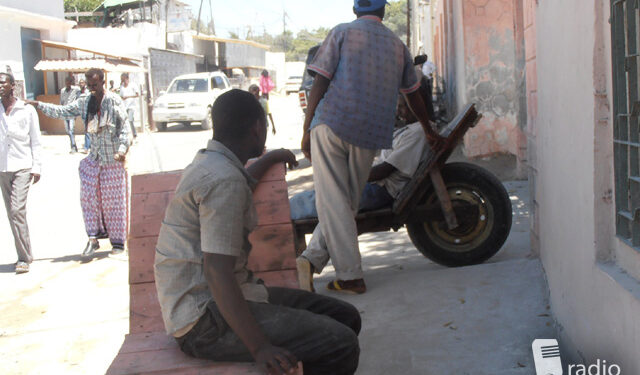
Fadumo Yusuf Ibrahim, 40, a displaced mother of eight, struggles to raise enough money to pay for just one meal for her family, despite working eight hours a day, five days a week, washing clothes for families in Baidoa, southern Somalia.
Fadumo, who lives in Ducaysane IDP camp, a relatively new camp five kilometres outside Baidoa town, comes back home with the equivalent of about $4, which isn’t enough to provide a decent living for her family.
“We cook once in a day. It’s very difficult, because we can’t afford to get more than one meal,” she said.
As her home in the camp is a distance from the town and the job market, the money that might pay for a second meal is what she spends on transport. She walks to Baidoa in the morning but has to pay $2 for a tuk-tuk taxi back home in the evening because of the insecurity in the area.
“We have to protect our lives in every case. I am a female and anything could happen to me at night, I could be attacked or raped. Therefore, I have to pay for a ride back home,” she stated.
She has been living in Baidoa for a year, since being displaced from Luq in Gedo region, where she was a businesswoman selling fresh produce. Her shop closed due to insecurity.
For the first four months she lived in a camp with some relatives on whom she depended for a living, but she and her children had to move out because the camp was overcrowded. She joined Ducaysane camp, newly established on the outskirts of town, and began earning her own living even though it is far from her places of work.
“I’ve had to borrow $110 worth of food on credit. I hope to repay it because I have to, but still we don’t have anything, all we can do is rely on God,” she said.
Fadumo is among the 270 families currently living in Ducaysane camp. The camp leader, Mohamed Hussein Borow, said that while the South West state administration had installed wells so the residents could access water, the families were concerned about the distances they had to travel to get to work. He said the families’ lack of ability to earn income was compounded by the lack of aid.
“We have been living in this camp for eight months and we have not received any aid, not even food. We are fasting and we don’t have food. We are headed to the rainy season, and we don’t have plastic shelters, our houses don’t even have doors,” he complained.
Another struggling camp resident is Mudey Abdi Kerow, 41, who has been moved between various camps in Baidoa for the past two years and settled in Ducaysane camp. He tries to support his family of 10 people by working on construction sites.
He earns 50,000 Somali shillings ($2) that just about pays for one meal for his large family, so he has also needed to take food on credit from local stores and even to ask neighbours for help with food.
He takes a tuk-tuk taxi to the building sites as the work is physically strenuous, especially during the Ramadan fasting period when he says he feels tired and thirsty with all the exertion.
“The place is five kilometres away, it’s far. The money I’m paid gets spent and it’s just not enough for me and my family,” he said.
Mudey was displaced from Tiyeglow, Bakool region, where he owned a five hectare farm that failed following protracted drought in 2022. He also lost his 30 camels to the drought.
There has been a rise in the number of IDP families moving to the outskirts of Baidoa, as the local authorities say they want to reduce congestion in the town centre while also giving displaced families their own land to settle on.
However, commuting to access jobs remains a huge challenge affecting many families, with breadwinners like Mudey and Fadumo having to choose between safe transport and meals.
Source: Radio Ergo


